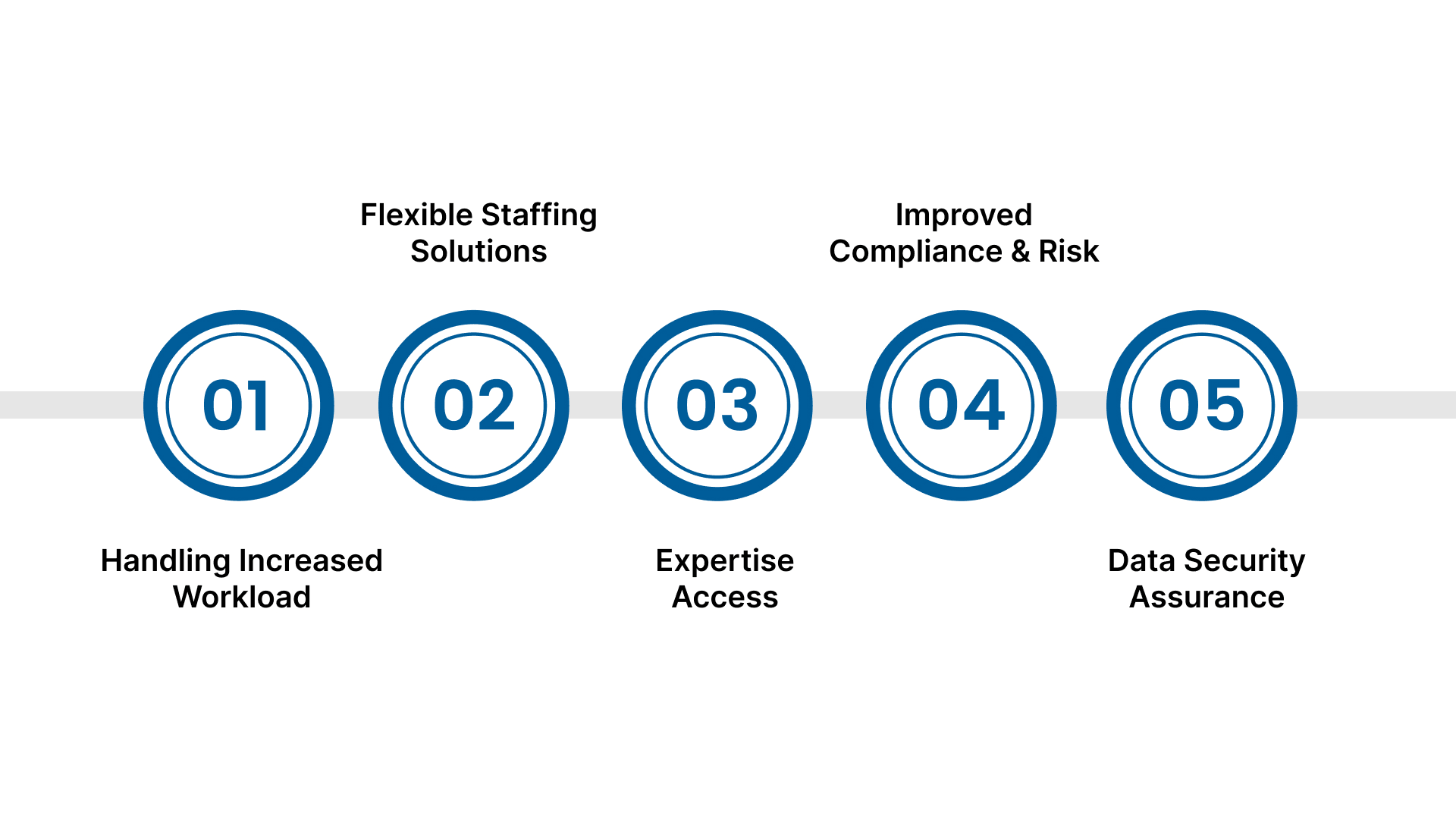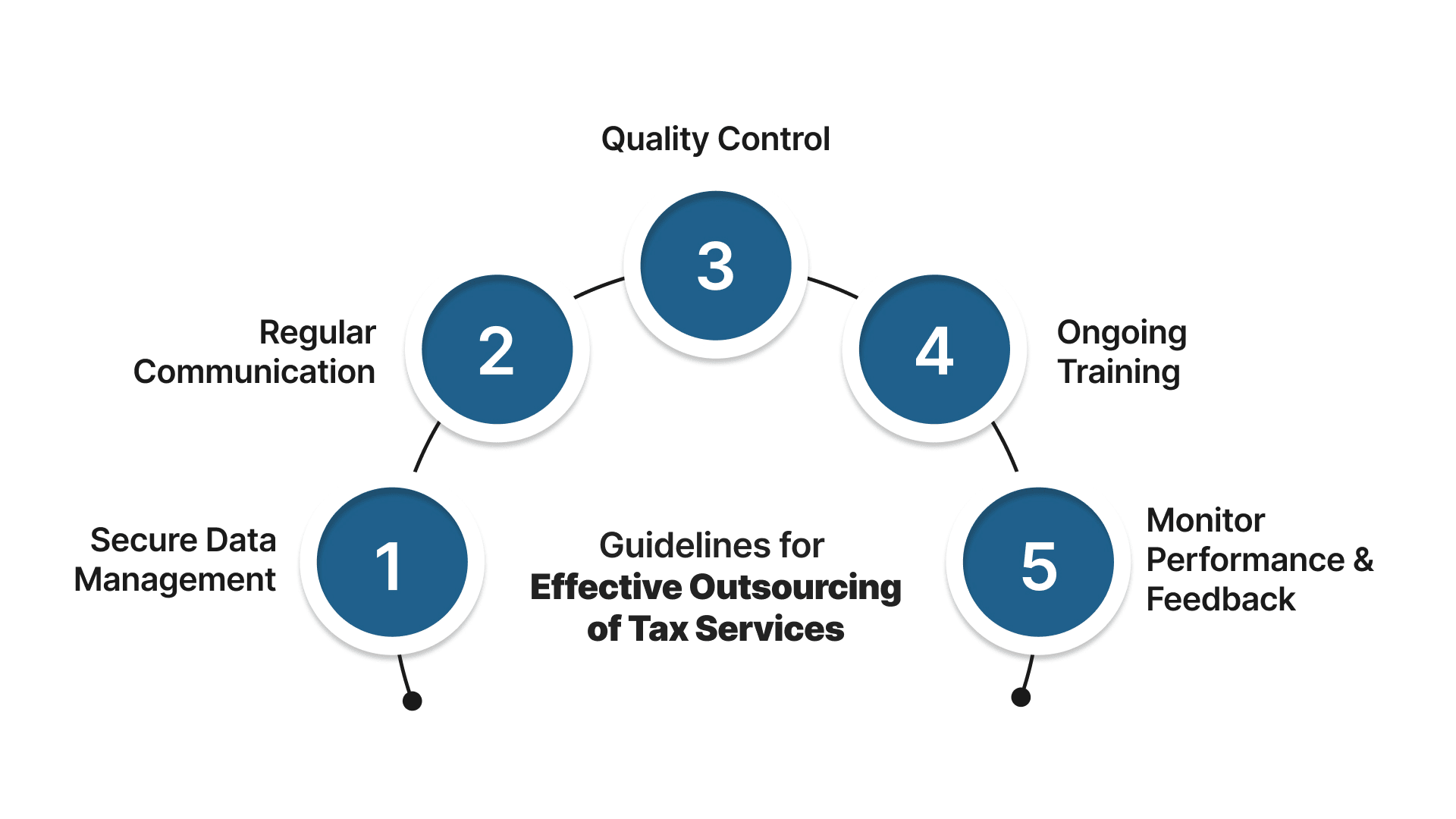.webp)
Managing tax obligations can be a complex and time-consuming challenge for businesses of all sizes. In fact, 80% of executives are planning to maintain or increase their investment in third-party outsourcing, reflecting a growing reliance on external expertise to handle critical financial functions.
Whether you are a small to mid-sized U.S. company or a professional accounting firm, handling tax preparation and compliance internally often requires significant resources, specialized expertise, and ongoing attention to changing regulations.
This is where outsourced tax services come into play. By entrusting tax functions to experienced external professionals, you can reduce operational burdens, gain access to up-to-date tax knowledge, and improve accuracy and compliance, all while controlling costs.
In this guide, you will learn what outsourced tax services entail, understand their benefits, and discover how they can add value to your business operations.
Outsourced tax services refer to the practice of engaging an external provider to handle tax preparation, filing, and compliance responsibilities on your behalf. This method enables businesses and accounting firms to access specialized expertise and up-to-date knowledge of tax laws without needing to manage these complex tasks internally.
By working with a dedicated provider, you benefit from accurate tax filing, improved compliance, and cost savings by reducing the need for in-house staff and related expenses such as salaries, training, and benefits. These services are particularly helpful during busy tax seasons, as they help alleviate the workload on your team, allowing them to focus on higher-value advisory activities or client relations rather than routine data entry.
Leading outsourced tax providers rely on secure systems and the latest technology to manage your sensitive data with precision and safety. This approach allows you to stay flexible in managing fluctuating tax workloads and ensures that even complex or industry-specific tax situations are accurately addressed by knowledgeable professionals.
With a clear understanding of tax preparation outsourcing, let’s explore how these services specifically support CPA firms during the critical audit season.
Also read: Guide to Outsourcing in Finance and Accounting Functions

The audit season is one of the busiest and most demanding periods for CPA firms. It often overlaps with tax season, creating a high-pressure environment where accuracy and timeliness are critical.
During this time, CPA firms must manage increased workloads, prepare detailed documentation, and ensure compliance with evolving regulations. Outsourced tax services can provide essential support throughout this period, helping you maintain quality while managing the operational challenges that come with audit season.
Here’s how outsourced tax services can help you:
During audit season, the volume of work for CPA firms often rises sharply. Outsourced tax services provide vital support by handling routine tax preparation and documentation tasks. This reduces the burden on your internal team, helping them meet deadlines without sacrificing accuracy or quality.
Hiring temporary staff to manage seasonal spikes can be costly and time-consuming. Outsourcing tax services allows you to scale your resources up or down based on demand without incurring the fixed expenses associated with additional employees. This flexible model helps manage costs while maintaining service levels.
Audit processes require detailed knowledge of tax regulations and compliance standards. Outsourced providers bring specialized skills and up-to-date tax knowledge, ensuring your audit documentation is thorough and consistent with current requirements. This minimizes the risk of errors and penalties during audits.
Tax laws and regulations change frequently, creating compliance challenges. Outsourced tax providers focus on keeping up with these changes, reducing the risk of non-compliance for your clients. Their expertise helps in preparing accurate reports and maintaining documentation that withstands regulatory scrutiny.
Handling sensitive financial and client information securely is critical during audits. Reputed outsourcing firms implement stringent data security measures to protect confidential data. This ensures that your client information remains safe throughout the audit process.
Beyond seasonal support, outsourced tax services offer a range of ongoing benefits that enhance your firm’s overall efficiency and compliance.
Outsourcing tax preparation offers multiple advantages that can directly impact your firm’s productivity, cost management, and client service quality. By entrusting routine tax tasks to external experts, you gain access to specialized skills and resources without the overhead of maintaining a larger in-house team. This strategic approach allows you to focus on more valuable activities and better serve your clients.
Key benefits of outsourced tax services include:
Having outlined the benefits, it’s helpful to examine the step-by-step process involved in outsourcing tax services effectively.
Also read: Benefits of Outsourcing Accounts Receivable for Businesses

Outsourcing tax services involves several key steps designed to ensure a smooth transition and effective collaboration. Understanding this process helps you set clear expectations and build a productive relationship with your outsourcing partner.
The key steps in this process include:
The first step is selecting a reliable and experienced outsourcing provider with expertise in U.S. tax regulations and CPA firm workflows. Consider their certifications, client reviews, technology capabilities, and ability to meet deadlines. A good partner aligns with your firm’s quality standards and communication preferences.
Tips for Choosing the Right Partner
Looking for an outsourced tax and accounting partner you can trust? VJM Global supports US businesses with expert tax outsourcing solutions. Book a free consultation today and discover how our expert team can support your firm’s growth and compliance requirements.
Clearly outline the types of tax returns and specific tasks you want to outsource. Set expectations regarding turnaround times, quality standards, and communication protocols. Defining this upfront helps avoid misunderstandings and ensures smooth collaboration.
Safeguarding sensitive client data is crucial. Implement secure methods for sharing financial documents and tax information, such as encrypted file transfers or secure cloud platforms. This reduces risks related to data breaches or loss.
Smoothly incorporate the outsourcing provider’s work into your firm’s existing processes. This includes using compatible software systems and establishing review checkpoints. Proper integration minimizes disruptions and maintains operational efficiency.
Maintain open lines of communication through regular updates, progress reports, and meetings. Monitoring the outsourced work helps address any challenges early and keeps the project on track.
Once the outsourced tax preparation is complete, review the returns and documentation for accuracy and compliance. Approve finalized documents before filing or delivery to clients. This step ensures adherence to your firm’s standards.
Periodically evaluate the outsourcing partnership based on performance metrics such as accuracy, turnaround time, and client satisfaction. Provide constructive feedback to strengthen the relationship and improve service quality over time.
Following the process, understanding the common tax preparation services helps ensure a productive and ideal outsourcing partnership.
Outsourcing tax preparation covers a broad range of services tailored to meet diverse tax filing and compliance needs for both individuals and businesses. Understanding these typical service offerings helps you identify the right scope for your outsourcing partnership.
Now that you are familiar with the range of tax preparation services available through outsourcing providers, it is important to follow best practices that ensure a successful partnership.

Outsourcing tax services can bring significant benefits, but to fully realize these advantages, you must follow several key best practices. By applying these practices, you ensure your firm retains control over quality, compliance, and client satisfaction while gaining the operational support needed to handle tax workloads:
Implement strong security protocols for sharing and storing sensitive client information. This includes encrypted data transfers, secure cloud platforms, and strict access controls to protect confidentiality.
Schedule frequent checkpoints to discuss progress, address issues, and review documentation. Open communication fosters trust and keeps the project aligned with your firm’s goals.
Conduct thorough reviews of outsourced work for accuracy and compliance before finalizing any tax returns. Quality control helps maintain your firm’s standards and reduces the risk of errors or penalties.
Ensure your outsourcing partner stays current with changes in tax laws and regulations through continuous training. Keeping up-to-date knowledge is critical for accurate and compliant tax preparation.
Establish key performance indicators and regularly assess the outsourcing provider’s work quality and timeliness. Providing constructive feedback supports continuous improvement and a stronger working relationship.
Even with best practices, outsourcing presents challenges that require proactive solutions to maintain high-quality service.
While outsourcing tax services offers many benefits, CPA firms can encounter several challenges during implementation and ongoing management. Recognizing these challenges early and adopting practical solutions will help you maximize the value of your outsourcing partnership.
Below, key challenges are outlined along with effective strategies to address each one.
Errors or inconsistencies in tax preparation can be costly. To prevent this, implement rigorous quality checks combined with clear communication protocols to ensure consistency and accuracy in all filings.
Regulations frequently change, making compliance challenging. Partner with providers who actively monitor tax law updates and maintain expertise to keep your filings accurate and compliant.
Disconnects between your systems and those of your outsourcing partner can slow workflows. Focus on selecting partners compatible with your technology and workflows, and establish clear collaboration protocols.
Understanding these challenges, it is equally important to consider how a trusted partner like VJM Global can provide tailored support to U.S. companies.
Also read: Managing Offshore Audit Work: Common Challenges and Solutions
VJM Global is a trusted Indian outsourcing partner specializing in comprehensive tax, accounting, and business consulting services tailored for U.S. companies. Based in India, our skilled team of professionals delivers cost-effective and high-quality outsourced tax services while ensuring strict compliance with U.S. regulations.
Our expertise spans international taxation, accounting outsourcing, audit and assurance, corporate advisory, and business setup services, making us well-equipped to address the complex needs of overseas clients.
Our tailored outsourcing solutions are designed to streamline your tax processes, reduce operational costs, and improve compliance outcomes. We use advanced technology and secure systems to manage your financial data accurately, supporting your firm’s growth and operational efficiency.
Choosing VJM Global means accessing a reliable offshore partner committed to your success through transparent communication, dedicated support, and scalable services.
Book a demo today to discover the strategic value VJM Global can bring to your operations.
Outsourced tax services involve hiring external experts to handle tax preparation, filing, and compliance tasks. Small to mid-sized businesses, CPA firms, and startups looking to reduce costs and improve accuracy often benefit from these services.
Outsourcing tax preparation to India helps US businesses cut costs by removing expenses for hiring, training, software, and employee benefits. Instead of carrying fixed overheads, you only pay for the services you use, keeping operational costs flexible and predictable.
Outsourced tax services in India help US CPA firms manage audit season by handling heavy workloads, preparing documentation, and ensuring compliance. This reduces errors and frees your in-house team to focus on critical audit tasks.
Key risks include data security concerns, quality control, and communication gaps. These can be managed through secure data transfer protocols, regular quality reviews, and transparent communication channels.
When outsourcing tax services to India, look for a partner with expertise in US tax laws, strong data security, proven client feedback, and the ability to scale as your needs grow. VJM Global, based in India, is a trusted partner offering international taxation, compliance, and accounting outsourcing services tailored for US companies, delivering reliable, secure, and personalized solutions.